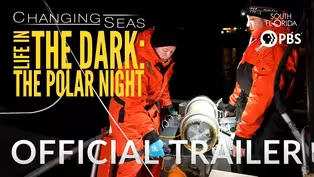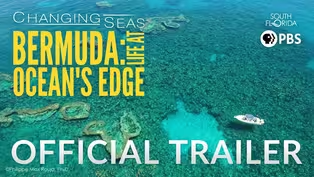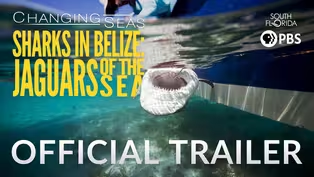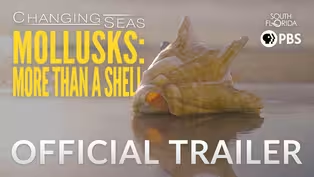Changing Seas
Sharks in Belize| Changing Seas | Preview
Preview: Season 15 | 4m 6sVideo has Closed Captions
Knowledgeable fishers collaborate with scientists to keep sharks abundant.
The Belize Barrier Reef is home to a diverse array of top predators like lemon sharks, nurse sharks, tiger sharks, and Caribbean reef sharks. In a unique collaboration, local fishers leverage their generational knowledge to help marine scientists and fisheries managers keep shark populations healthy for all.
Problems playing video? | Closed Captioning Feedback
Problems playing video? | Closed Captioning Feedback
Changing Seas is presented by your local public television station.
Major funding for this program was provided by The Batchelor Foundation, encouraging people to preserve and protect America’s underwater resources. Additional Funding was provided by Trish and Dan Bell and The Parrot Family Endowment for Environmental Education.
Changing Seas
Sharks in Belize| Changing Seas | Preview
Preview: Season 15 | 4m 6sVideo has Closed Captions
The Belize Barrier Reef is home to a diverse array of top predators like lemon sharks, nurse sharks, tiger sharks, and Caribbean reef sharks. In a unique collaboration, local fishers leverage their generational knowledge to help marine scientists and fisheries managers keep shark populations healthy for all.
Problems playing video? | Closed Captioning Feedback
How to Watch Changing Seas
Changing Seas is available to stream on pbs.org and the free PBS App, available on iPhone, Apple TV, Android TV, Android smartphones, Amazon Fire TV, Amazon Fire Tablet, Roku, Samsung Smart TV, and Vizio.
Providing Support for PBS.org
Learn Moreabout PBS online sponsorship- [Narrator] Beautiful Belize.
Abundant tropical rainforests, towering jungle mountains, and vivid coral reefs.
With nearly 36% of its land and 20% of its ocean territory safeguarded within protected reserves, this small developing country stands out as a world leader in conservation.
- We have had a long history of conservation, both from the terrestrial side and also from the marine side.
- [Narrator] Belize recently made a bold commitment to preserving its stunning offshore ecosystems for future generations with a pledge to extend marine protections to 30% by 2026.
This move marks more than four decades of sustainable management informed by science.
- [Demian] In the late '80s and '90s they established the world's first Jaguar reserve, the Cockscomb Basin Wildlife Sanctuary, that was based on research by several people, including Dr. Alan Rabinowitz.
- [Narrator] Using data collected from remote cameras and animal tagging, Panthera founder Alan Rabinowitz, a world expert on wildcats, inspired the Belizean government to protect its critical jaguar habitat in 1986.
Today, marine scientists are using similar methods to inform management decisions about critical shark habitat, effectively creating the Cockscomb of the Sea.
- [Demian] So we do all those same things here on the atolls, but for sharks, sort of the jaguars of the ocean.
- [Narrator] Shark populations here serve not only an essential ecological role in the reef system, but they are paramount to the country's tourism industry and national fisheries, requiring the government of Belize to strike a delicate balance between stakeholders.
- [Fisher] Conservation goes hand-in hand with the livelihood.
If you conserve something, it doesn't mean you cannot fish it.
It just means that you need to now operate in a more sustainable manner to ensure that you have this fishery for a very long time not just for you, but for your kids.
- [Narrator] In a pioneering collaboration, marine scientists and local fishers work together to collect data on shark abundance inside and outside of protected areas.
- [Researcher] 173.
- [Narrator] These long-term surveys provide the fisheries department with what they need to manage shark populations sustainably.
- [Researcher] The most efficient and most effective management plan that you can have is one where the people who actually use the resource, want to be involved, care about it, and want to protect it.
- [Researcher] Alright, tag number 836.
- [Narrator] More than 20 years in the making, these collaborative efforts to better understand shark behavior have already resulted in marine conservation successes.
How are scientists, fishers, and managers working together to build more sustainable fisheries in Belize?
And what does the future hold for local shark populations, the Jaguars of the Sea?
Life in The Dark: The Polar Night | Changing Seas | Preview
Preview: S15 | 3m 53s | Researchers brave the Arctic’s cold and dark to reveal the mysteries of the Polar Night. (3m 53s)
Bermuda: Life at Ocean's Edge | Changing Seas | Preview
Preview: S15 | 4m 49s | Amid shipwrecks and shifting sands, Bermuda’s corals offer clues to climate resilience. (4m 49s)
Sharks in Belize| Changing Seas | Preview
Video has Closed Captions
Preview: S15 | 4m 6s | Knowledgeable fishers collaborate with scientists to keep sharks abundant. (4m 6s)
Mollusks: More Than A Shell | Changing Seas | Preview
Video has Closed Captions
Preview: S15 | 3m 16s | Researchers and citizen scientists document the fascinating lives of seashells. (3m 16s)
Providing Support for PBS.org
Learn Moreabout PBS online sponsorship
- Science and Nature

Explore scientific discoveries on television's most acclaimed science documentary series.

- Science and Nature

Capturing the splendor of the natural world, from the African plains to the Antarctic ice.












Support for PBS provided by:
Changing Seas is presented by your local public television station.
Major funding for this program was provided by The Batchelor Foundation, encouraging people to preserve and protect America’s underwater resources. Additional Funding was provided by Trish and Dan Bell and The Parrot Family Endowment for Environmental Education.



